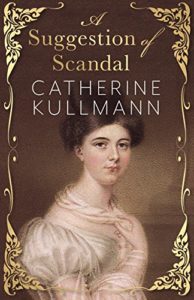Welcome to the weekly Irish Independent Authors Collective (IIAC) author interviews. Today on my blog, I’m delighted to introduce you all to Catherine Kullmann. I hope you all enjoy learning more about Catherine and be sure to check out her books.
Irish Independent Authors’ Collective – Catherine Kullmann
Tell me a little bit about yourself and why you decided to join the Irish Independent Authors’ Collective?
I live in Dublin and write historical fiction set in the extended Regency period from 1800 to 1830. have self-published two historical novels, The Murmur of Masks and Perception & Illusion and my third, A Suggestion of Scandal has just been released. All three are available as e-books and paperbacks. I have also published an historical, gothick short story called The Zombi of Caisteal Dun that is initially available as e-book only. However, there are other short stories and novellas in the pipeline, so I hope to have a paperback anthology one day
I joined the IIAC to help create a platform for Irish Independent Authors that will raise the profile of independent publishing in Ireland and result in increased sales for our members. There are literally hundreds if not thousands of independent authors in Ireland who struggle individually to get their books into Irish bookshops and bring them to the notice of Irish readers. Together, we will work to rectify this and, in the meantime, hold our own events to reach the reading public directly.
How long have you been writing and why did you decide on self-publishing?
I started writing about eight years ago after taking early retirement. I have an agent but have to date not been successful in finding a traditional publisher—I received several warm rejections saying my books fall between the stools of historical fiction and historical romance—I call them historical fiction for the heart and for the head. I decided to self-publish partly because I had several books in the pipeline and did not want to stagnate, and partly because of ‘time’s winged chariot’. In my mid-sixties, I did not feel I had the luxury of time to wait indefinitely for an acceptance.
Do you think the stigma surround self-publishing is lessening?
Slowly. It is a chicken and egg situation. Readers beget readers, but first you have to attract their attention. I think once readers have discovered one Indie author they enjoy, they will be more open to trying another. If every bookshop in Ireland had a dedicated section for Irish Independent authors, it would encourage readers to try something new and different.
What do you feel the hardest part of self-publishing is?
Marketing on a non-existent budget.
What genres do you write?
I write historical fiction set in the extended Regency period from 1800 to 1830. This is a period that fascinates me. It is full of ‘what ifs?’ If there had been no Act of Union in 1800, who knows how Irish history would have developed? Supposing the UK had won the Anglo-American war of 1812 or Napoleon had won at Battle of Waterloo? These are all events that still shape our modern world. At the same time, the ruling aristocracies were being challenged by those who saw the need for social and political reform, while the industrial revolution which led to the transfer of wealth to the manufacturing and merchant classes was underway. Women, who had few or no rights in a patriarchal society had begun to raise their voices, demanding equality and emancipation. It is the beginning of our modern society.
What is your favourite story or character that you have written?
This is like asking a mother which of her children is her favourite! I enjoy creating them all, heroes, heroines, villains and villainesses not to mention all the secondary characters who help bring a book to life. I have a great fondness for Lady Needham, Luke Fitzmaurice’s ‘grand-godmother’ in The Murmur of Masks, who also appears in Perception & Illusion. An elderly lady, she is inclined to be blunt but has a very kind heart and will always come to the assistance of young people in social distress.
What time of day do you prefer to write?
I generally write for a couple of hours in the morning and a couple in the afternoon. If I am really caught up in a scene I write in the evening as well but prefer not to. My husband also writes and we like to spend our evenings together. As we are both retired we have the luxury of being able to make writing the day job.
Do you have a special writing space?
Yes. I have a study full of books and prints and engravings from the period. I research constantly—I am always on the lookout for those quirky bits of information that help bring the past to life. When you write historical fiction, you have to be as comfortable in your chosen period as in your own time so you need a vast amount of background detail that you may never use directly but informs your writing.
Do you outline your books ahead of time or just go for it?
There is always a trigger—a ‘what if?’ or ‘what happened next?’ and I know where I want to finish up. My books all have a strong romantic arc and I am a believer in a happy end. I spend considerable time creating the characters—what their back story is and what sort of people they are. This gives me enough to get started. After that, I am more a pantser than a plotter. I love the moment when a book takes flight.
Who are your favourite Irish authors?
Perhaps it’s because I lived abroad for so long, but I find it difficult to relate to many modern Irish authors. I love Frank O’Connor’s short stories. At present, I’m reading Maria Edgeworth’s Letters from Ireland that span the years from 1776 to 1849 and find them fascinating although the disconnect she reveals between even the more enlightened Anglo-Irish gentry and the native Irish is jarring in the extreme. Over the last couple of years, I have enjoyed novels and short stories by Pam Lecky, Dianne Ascroft, Hazel Gaynor and Evie Gaughan and plan to explore further the works of Irish indie authors. I can’t wait for our first book fair where I can browse to my heart’s content!
Your latest book A Suggestion of Scandal, a historical romance, has just been released. What was the inspiration behind it and is there anything you would like readers to know?
The inspiration was the report of a famous Regency divorce case that was triggered when a governess walked into a drawing-room to discover a married woman and her lover in flagrante delicto. The wife involved immediately fled her home and the governess was a witness in the subsequent trials at the ecclesiastical and civil courts and in the House of Lords. I wondered what would have happened if the couple had tried instead to conceal their guilt. What might have happened to their witness?
Is your latest book part of a series and if so how many books are planned for the series?
My novels are not a series but are set in the same world so you will meet characters from one in another and someone who has had a walk on part in one may have a leading role in another.
Where can readers find out more about you?
My website is www.catherinekullmann.com/ and my Facebook page is fb.me/catherinekullmannauthor
My Amazon author page is https://www.amazon.co.uk/Catherine-Kullmann/e/B01IW3F4MA/ref
A Suggestion of Scandal by Catherine Kullmann
If only he could find a lady who was tall enough to meet his eyes, intelligent enough not to bore him and had that certain something that meant he could imagine spending the rest of his life with her.
As Sir Julian Loring returns to his father’s home, he never dreams that ‘that lady’ could be Rosa Fancourt, his half-sister Chloe’s governess. Rosa is no longer the gawky girl fresh from a Bath Academy whom he first met ten years ago. Today, she intrigues him. Just as they begin to draw closer, she disappears—in very dubious circumstances. Julian cannot bring himself to believe the worst of Rosa but if she is blameless, the real truth could be even more shocking, with far-reaching repercussions for his own family, especially for Chloe.
Driven by her concern for Chloe, Rosa accepts an invitation to spend some weeks at Castle Swanmere, home of Julian’s maternal grandfather. The widowed Meg Overton has also been invited and she is determined not to let the extremely eligible Julian slip through her fingers again.
When a ghost from Rosa’s past returns to haunt her, and Meg discredits Rosa publicly, Julian must decide where his loyalties lie.
Buy A Suggestion of Scandal from Amazon in ebook and paperback https://amzn.to/2OPkb2o
Until next time,
Keep reading and writing,
Amanda
Amanda J Evans is an award-winning Irish author and writing coach. Amanda writes adult romance that often crosses into paranormal and fantasy. Growing up with heroes like Luke Skywalker and Indiana Jones, her stories centre on good versus evil with a splice of love and magic thrown in too. Her books have all won awards and her novella, Hear Me Cry, won the Book of the Year Award at the Dublin Writers Conference 2018. Amanda is also the author of Surviving Suicide: A Memoir from Those Death Left Behind, published in 2012.


